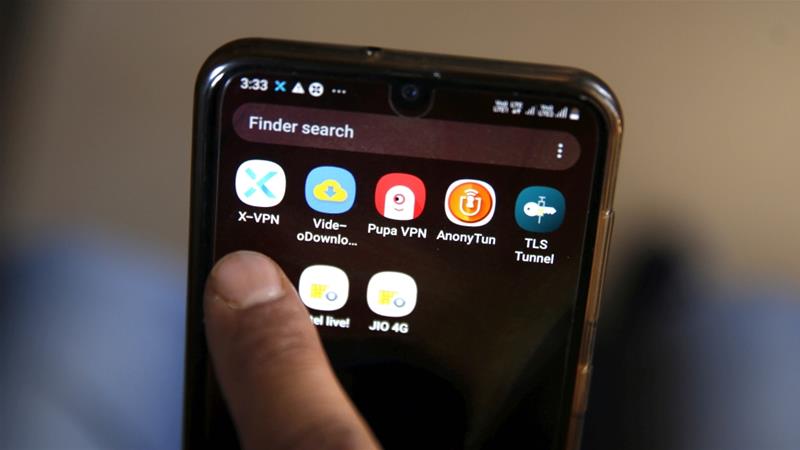Panic in Kashmir as case filed against social media users
![Many users had started using Twitter and Facebook, but the open FIR has created a panic among many social media users [File: Farooq Khan/EPA]](https://www.aljazeera.com/mritems/imagecache/mbdxxlarge/mritems/Images/2020/2/13/4413ac7f3a09457c8b52c79bb028ce4b_18.jpg)
Srinagar, Indian-administered Kashmir – Authorities in Indian-administered Kashmir have filed a police case against social media users under “anti-terror” laws for defying a social media ban using proxy servers.
The move has triggered panic among the people of Kashmir, which has been under a security and communication lockdown since August 5, when the Muslim-majority region was stripped of its limited autonomy.
A first information report (FIR or police complaint) has been filed against unnamed users under the Unlawful Activities Prevention Act (UAPA). A person booked under the UAPA can be jailed for months without bail.
The police said the action came against those who misused social media sites for propagating “secessionist ideology and promoting unlawful activities”.
“Taking a serious note of misuse of social media, there have been continuous reports of misuse of social media sites by the miscreants to propagate the secessionist ideology and to promote unlawful activities,” read a statement issued by the region’s police, which directly comes under India’s interior affairs ministry.
Authorities restored low-speed 2G internet on January 24 – six months after the internet was cut off from the region – but the ban on social media continued. Kashmiris have been using virtual private networks (VPNs) to access blacklisted sites, particularly social media.
Many users had started posting updates on Twitter and Facebook, but the open FIR has now created a panic among many of them.
“I did not use the social media to post any political update but I am really panicked and have now deleted the VPN and deactivated my social media accounts. It means they can now arrest anyone now,” said 25-year-old university student Sehba Mir.
Some users also alleged that their phones are being checked by the security forces at the checkpoints to delete the proxy servers from their phones.
“I was stopped outside a tertiary care hospital in Srinagar two days ago. The soldiers checked my phone and deleted VPN from it,” a management student in his early twenties, who did not want to be named, told Al Jazeera.
An official of a private telecom company told Al Jazeera that the operators have been asked by the authorities to install the firewalls and block the blacklisted sites and VPNs.
“It has become difficult to control it completely,” the official said on condition of anonymity.
Kashmir, which is the longest pending dispute between India and Pakistan, has been on an edge for the past six months after India revoked Article 370 that gave the region special status.
Under the government crackdown, strict communication and military curbs were imposed in the region to prevent protests. While the restrictions have gradually been eased, there continues to be a blanket ban on the use of social media sites.
A senior police official told Al Jazeera that they are “examining various accounts and screenshot after which action will be initiated”.
“Anyone found using social media and posting any anti-national material can be called for questioning,” the official said, adding that “the action is aimed to find the characters spreading the rumours and take action against them through proper legal procedure”.
‘Fearful and panicky’
The FIRs have been registered under the UAPA and Section 66-A (b) of the Indian Information Technology (IT) Act – misleading people with electronic communication – but the experts have termed it illegal saying the section was struck down by India’s top court in March 2015 as it violated free speech.
Geeta Seesu, a Mumbai-based co-founder of FreeSpeech Collective, an advocacy group that works for promoting free speech in India, termed the FIR as a “sweeping generalisation to intimidate and criminalise everyone”.
“Applying UAPA is an attempt to make people – none of whom are named and identified – fearful and panicky,” Seesu said.
The Internet Freedom Foundation, an organisation based in India that advocates for digital rights and net neutrality, has also criticised the filing of the FIRs.
Srinivas Kodali, an independent researcher based in Hyderabad who studies data and internet in India, termed the move as “unconstitutional”.
“This is a clear violation of digital rights of people. Today it is being implemented in Kashmir and tomorrow it can become a general practice in India,” he told Al Jazeera.
[“source=aljazeera”]




